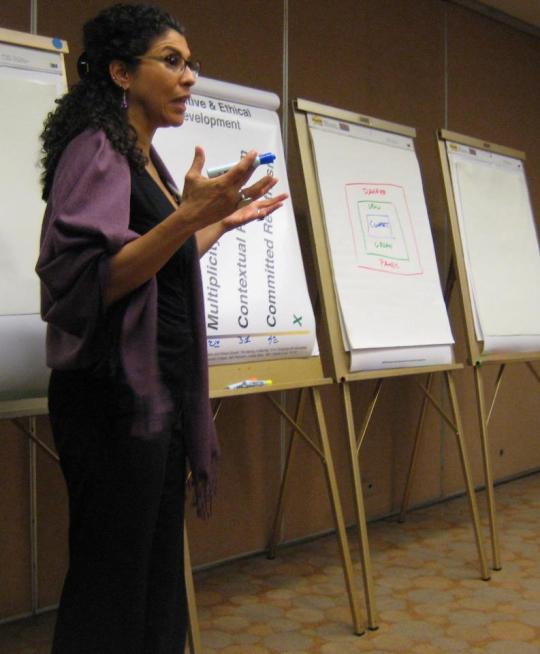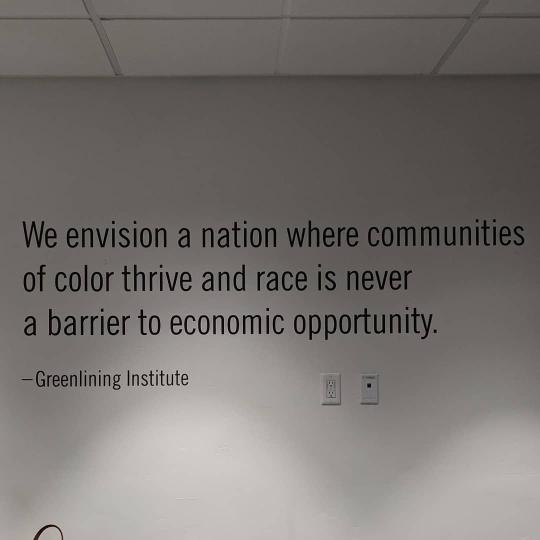Project Puerto Rico–Renewing Our Commitment to Puerto Rico’s Recovery
“It didn't start with Maria”. This is how Nanci Luna Jiménez, Founder and President of Luna Jiménez Institute for Social Transformation (LJIST), opened the Project Puerto Rico event in Oakland’s Greenlining Institute on January 30th, 2019. Through the generous sponsorship by SSU’s Center for Community Engagement, I was able to attend the Project Puerto event in Oakland, the third iteration of a 15-city tour across the United States. This opening sentiment perfectly encapsulated what lay in store for workshop participants over the next couple of hours: a contextualization and amplification of Puerto Rico’s current devastation as being the result of many more factors than just simply Hurricane Maria. Rather, the destruction of Puerto Rico and the death of 2,975 inhabitants can also be directly attributed to a long history of colonization, exploitation, and capitalism.
Nanci launched the project in September 2018, on the one-year anniversary of Hurricane Maria. The timing of the launch was intentional: Project Puerto Rico is meant to inject energy into a cause that no longer draws media buzz and has seen a drop-off in support for its cause and victims. Rather than simply focusing on aid efforts, Project Puerto Rico promotes specific and concrete political actions we all can take to alleviate Puerto Rico from highly restrictive policies and legislation that have prevented the island from rising to its full potential as an autonomous and free country. The initiative educates on how to exercise our constituent power to ensure that Puerto Rico and its people are provided with the same human rights as all American citizens. It is our charge to use our influence as voters and urge elected officials to ethically respond to the needs of Puerto Rico and its people. So how do we channel our energies to help Puerto Rico in this time of crisis?
First, we must support Puerto Rican climate refugees. Puerto Rico’s infrastructure was devastated by the storm, and recovery is expected to take years, causing huge economic pain for island residents, who are American citizens. Many Puerto Ricans have been displaced from the island out of necessity, not by choice. The Climate Impact Lab estimates that Hurricane María will reduce per capita income in Puerto Rico by 21% over the next 15 years. In the three months following the hurricane, hundreds of thousands of people living in Puerto Rico left for the U.S. mainland, relocated through the Transitional Shelter Assistance (TSA) program. The Center for Puerto Rican Studies at Hunter College expects this mass exodus to continue, estimating that Puerto Rico may lose up 14% of the population in the next several years. As Puerto Ricans flee the island for safety in U.S. cities, we must support meeting their basic needs, facilitating their transition to life on the mainland, and connecting them with local community support resources. We also need to, as a country, acknowledge the science of climate change: climate-influenced disasters are now our new reality. Global warming will indeed make hurricanes stronger and wetter, which will increasingly drive people from their homes. We must support leaders that are creating plans for climate resilience; that is, plans which rebuild in a way that provides greater resilience against future storms and moves populations away from coastlines.
Secondly, we must promote dropping the debt and giving Puerto Ricans a clean slate for relief and rebuilding efforts. The colonial relationship that has prevailed between the U.S. and Puerto Rico since 1898 produced uncommon profits for American subsidiaries on the island for more than a century and an overreliance on U.S. trade and dollars. Even as the federal government emptily claimed Puerto Rico to be a self-governing territory in 1952, U.S. economic domination remains. All imports are required to come in on U.S. ships, which makes the cost of living double that in the States. And at present, Puerto Rico enjoys no reciprocity in this economic model. In fact, Congress ended IRS tax exempt status for U.S. companies in Puerto Rico in 2006 and they abandoned the island in droves for other, more tax-friendly countries. The economy crashed and the country's debt spiked. After the hurricane, the island’s scarce resources must be dedicated to Puerto Rico's people, not to be paid back to Wall Street banks and millionaires. This economic handicap and continued inequality is the most urgent risk for Puerto Rico. Puerto Rico deserves a clean financial slate and a level playing field for participation in the national economy.
Finally, contact your representatives to permanently exempt Puerto Rico from the Jones Act, an obscure 1920 shipping regulation that is strangling the Puerto Rican economy and efforts to rebuild the country. The Jones Act is unfair, outdated, and has delayed relief and drastically increased the cost of living within Puerto Rico. Because of the Jones Act, Puerto Ricans pay double what everyone else pays for simple items like water and food. Permanently exempting Puerto Rico from the Jones Act helps the island's long-term recovery without federal aid spending and without any encumbrance to mainland taxpayers. We must also demand full voting rights for all American citizens, including Puerto Rico and other U.S. territories. Without political power, we cannot expect Puerto Rico to begin to stabilize or demonstrate economic efficacy.
As the 2020 presidential election nears, keep politicians accountable to the people of Puerto Rico and ensure the candidates you are considering are fully committed to long-term recovery on the island.

Author: Catherine Fonseca, Outreach & Inclusion Librarian





